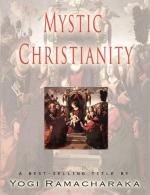THE FOURTH LESSON.
THE BEGINNING OF THE MINISTRY.
When Jesus reached his native land, after the years of travel in India, Persia and Egypt, he is believed by the occultists to have spent at least one year among the various lodges and retreats of the Essenes. By reference to the first lesson of this series you will see who and what was this great mystic organization—the Essenic Brotherhood. While resting and studying in their retreats His attention was diverted to the work of Johannen—John the Baptist—and He saw there an opening wedge for the great work that He felt called upon to do among His own people. Dreams of converting His own race—the Jews—to His conception of Truth and Life, crept over Him, and he determined to make this work His great life task.
The feeling of race is hard to overcome and eradicate, and Jesus felt that, after all, here He was at last, at home, among His own people, and the ties of blood and race reasserted themselves. He put aside His previous thoughts of a world-wandering life, and decided to plant the standard of the Truth in Israel, so that from the capital of the Chosen People the Light of the Spirit might shine forth to all the world. It was Jesus the man—Jesus the Jew—that made this choice. From the broader, higher point of view He had no race; no country; no people;—but His man nature was too strong, and in yielding to it he sowed the seeds for His final undoing.
Had he merely passed through Judea as a traveling missionary, as had done many others before Him, he would have escaped the punishment of the government. Although He would have aroused the hatred and opposition of the priests, He would have not laid Himself open to the charge of wishing to become the King of the Jews, or the Jewish Messiah, come to resume the throne of David, His forefather. But it avails us nought to indulge in speculations of this kind, for who knows what part Destiny or Fate plays in the Great Universal plan—who knows where Free-Will terminates and Destiny moves the pieces on the board, that the Great Game of Universal Life be played according to the plan?




